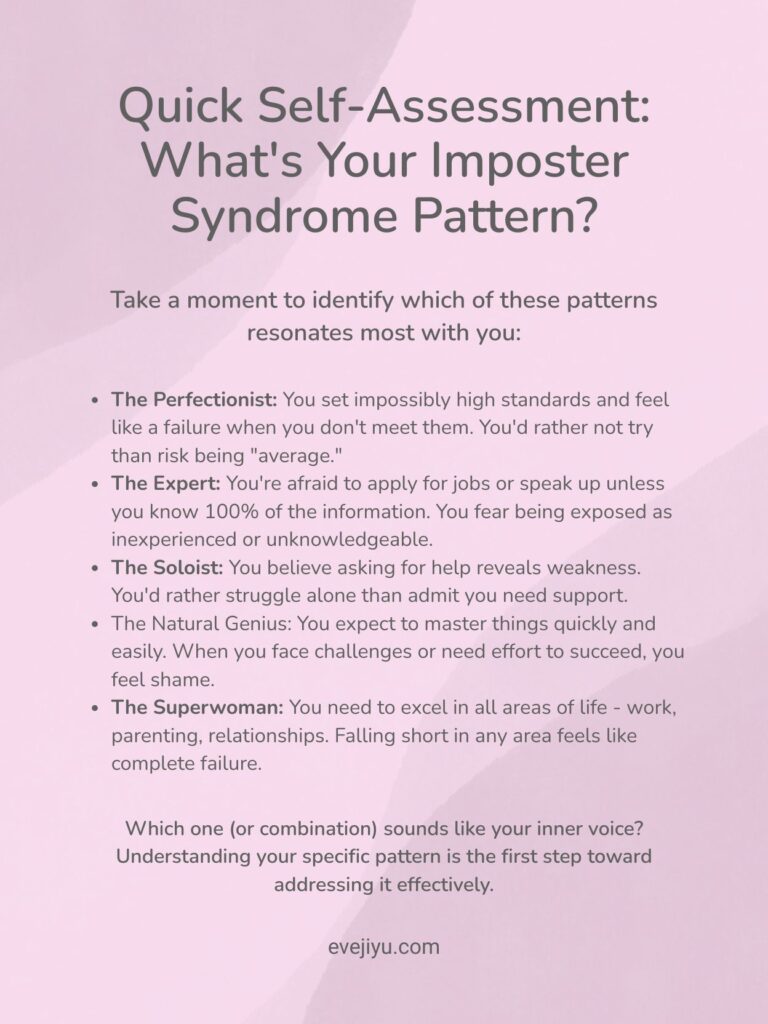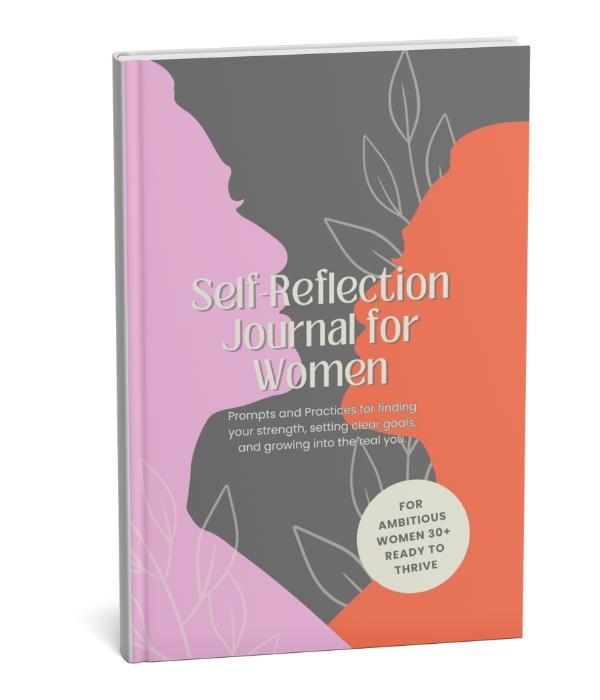Table of Contents
Understanding Imposter Syndrome in Your 30s
How to overcome imposter syndrome in your 30s starts with recognizing you’re not alone. Ever feel like a fraud despite your success? Like you’re just floating downstream, waiting for someone to discover you don’t belong where you are? If you’re a woman trying to overcome imposter syndrome in your 30s, this feeling is more common than you think – and you’re definitely not broken.
I remember sitting in my university lecture hall, surrounded by what seemed like the brightest minds I’d ever encountered. Here I was, a girl from a small town, convinced I’d only made it there by “happy accident.” Every good grade felt like luck, every achievement undeserved. That nagging voice in my head whispered the same thing over and over: You don’t belong here.
Fast forward to my thirties, and that voice was still there – louder than ever. Despite being a successful project manager, despite promotions and recognition, I couldn’t shake the feeling that I was just pretending to be capable. Sound familiar?
If you’re a woman in your late twenties to forties struggling with these feelings, this guide on how to overcome imposter syndrome in your 30s is for you. Imposter syndrome is incredibly common, affecting up to 70% of people at some point in their lives, but it hits women in this age group particularly hard. Today, I want to share not just the psychology behind why this happens, but the real tools and mindset shifts that helped me – and can help you – build genuine, unshakable confidence.
What Is Imposter Syndrome?
Learning to overcome imposter syndrome in your 30s requires understanding. Imposter syndrome is that persistent feeling of being a fraud, despite evidence of your competence and achievements. It’s the voice that tells you your success is due to luck, timing, or fooling others rather than your actual skills and hard work. Many women wonder how to overcome imposter syndrome in your 30s when it feels so overwhelming.
Signs You’re Experiencing Imposter Syndrome
The signs are often subtle but devastating: overworking to “prove” yourself, perfectionism that paralyzes you, and a constant fear of being “found out.” You might downplay your achievements, attribute successes to external factors, or feel like you’re always one step away from everyone discovering you’re not as capable as they think. Recognizing these signs is the first step to overcome imposter syndrome in your 30s effectively.
I lived this reality for years. Even when I was recognized as one of the best project managers at my agency, earning more than seasoned colleagues, my internal dialogue remained the same: “What if this is all just luck? What if they realize I’m not actually good at this?”

Why Women in Their 30s Struggle More
There’s something particularly cruel about how imposter syndrome intensifies for women in their thirties. The journey to overcome imposter syndrome in your 30s becomes more challenging because this decade brings unique pressures that create the perfect storm for self-doubt.
Life Transitions and Career Pressure
First, there are the life transitions. Your thirties often mark pivotal career moments – promotions, industry changes, or entrepreneurial ventures. These career pressures make it even harder to overcome imposter syndrome in your 30s.
I experienced this firsthand when I made the bold decision to quit my well-paid, “comfortable” job at 31. For the first time, I felt like I could do more, like maybe I was worth more. But that fresh start? It pushed me right back into the depths of imposter syndrome when things didn’t go as planned.
Then there’s the societal expectation that you should “have it all figured out by now.” While your peers seem to be climbing corporate ladders with confidence, buying homes, and starting families, any deviation from this perceived timeline can trigger intense feelings of inadequacy. My inner critic became relentless during this period: While people your age have stable careers, homes, and families, you’re alone, at the beginning of a new career, and not confident.
Social Media and Comparison Culture
Social media doesn’t help either. We’re constantly bombarded with curated success stories – the friend in a high-ranking position at a multinational company looking blissful on Instagram, the acquaintance who travels the world for business. But we don’t see behind the scenes. We don’t know if that successful friend struggles with anxiety, if that jet-setting acquaintance has quality time for herself, or if they’re fighting their own battles with feeling like a fraud.
The emotional toll is real. During my worst period, I lost significant weight, lived surrounded by stress and anxiety, and suffered from insomnia. While I was showing a happy life on social media, inside I felt defeated and didn’t know what to do next.
How Imposter Syndrome Impacts Your Confidence
Imposter syndrome doesn’t just make you doubt your achievements – it fundamentally undermines your confidence and keeps you stuck. It creates a vicious cycle where you either avoid opportunities (because you don’t think you deserve them) or overwork yourself to the point of exhaustion trying to prove you belong.
I almost let imposter syndrome make me give up the biggest opportunity of my life – the chance to create, to write my blog, to start my own business. I didn’t feel it was worth it. I didn’t feel I was worth it. The syndrome had convinced me that my achievements were insignificant and my skills worthless.
When you constantly attribute your successes to luck rather than skill, you rob yourself of the confidence that comes from acknowledging your capabilities. Every promotion, every compliment, every achievement gets filtered through the lens of “I just got lucky” instead of “I earned this.”

Proven Strategies to Overcome Imposter Syndrome
Here’s what I’ve learned through years of battling these feelings – both in my own life and through deep introspection and self-work. These strategies to overcome imposter syndrome in your 30s aren’t just theoretical concepts; they’re practices that have genuinely transformed how I see myself and my worth.
Name It to Tame It
The first step in overcoming imposter syndrome is recognizing it for what it is. When that familiar voice starts whispering that you’re not qualified or don’t deserve your position, call it out. Say to yourself: “This is imposter syndrome talking, not reality.”
I started doing this during my career transition. Instead of letting the negative thoughts spiral, I would literally say out loud: “That’s my imposter syndrome. That’s not the truth about who I am or what I’m capable of.”
Track and Celebrate Your Wins
Start keeping a daily journal of your achievements, no matter how small. This was a game-changer for me. I began mentally praising myself for the smallest accomplishments, for my efforts, not just major outcomes.
Write in your journal not just what you accomplished, but the skills and effort that made it possible. When you consistently downplay your wins – like I did with my project management successes – you need concrete evidence to counter that narrative.
Reframe Your Inner Critic
Instead of “I’m not qualified for this,” try “I’m still growing and learning.” Instead of “I don’t deserve this success,” try “I worked hard and earned this opportunity.”
The practice that has helped me most is learning to decouple my value from my productivity and impact. I had to realize that I am valuable regardless of my output. This shift is crucial because when your entire self-worth depends on perfect outcomes, you’ll never feel secure in your abilities.
Adopt a Growth Mindset
Embrace the idea that abilities can be developed through dedication and hard work. Your current skill level isn’t fixed – it’s a starting point for growth.
Talk About It
Vulnerability reduces shame. The period when I lived with my close friend – who became like my therapist – transformed my self-confidence. We had long evenings with cups of tea, open hearts, and honest conversations about inner experiences, childhood traumas, and work struggles. Those open discussions with someone I trusted helped me rebuild aspects of my self-esteem I didn’t even know I was missing.
Consider joining women’s groups, finding a mentor, or working with a therapist. You don’t have to carry these feelings alone.
Detox Your Digital Space
Unfollow or mute accounts that trigger comparison. Follow people who share authentic, behind-the-scenes content that reminds you that everyone struggles sometimes.
I spent significant time and energy working on my self-image, with the goal of stopping comparisons with others – not just on social media, but in real-life conversations with acquaintances too.
Mindset Shifts That Build Real Confidence
Here are the fundamental shifts that changed everything for me:
Confidence isn’t perfection; it’s presence. You don’t need to have all the answers or never make mistakes. You just need to show up authentically as yourself.
You’re allowed to take up space without “earning” it first. Your worth isn’t determined by your productivity or achievements. You matter simply because you exist.
Redefine success using internal validation, not external approval. I had to learn that everything I get through my work and efforts, I am worth. I don’t need others to validate my achievements for them to be real and meaningful.
As Maya Angelou said, “You alone are enough. You have nothing to prove to anybody.” This became my anchor during the darkest moments of self-doubt.
Action Plan: 5-Minute Daily Practices to Reinforce Self-Worth
These small daily actions can compound into significant confidence over time:
- Confidence journal entry: Write down one thing you accomplished today and the skill it required
- Power pose or affirmation: Stand tall and remind yourself of one thing you’re genuinely good at
- Accept compliments gracefully: Say “thank you” instead of deflecting with “it was nothing” or “I got lucky”
- Set one small boundary: Practice saying no to something that doesn’t serve you
- Learn something new: Building capabilities naturally builds confidence
The key is consistency, not perfection. Even when I’m fighting imposter syndrome daily, these tools help me not sink into the depths of negative self-talk.
When to Seek Support
There’s no shame in getting professional help. If imposter syndrome is significantly impacting your mental health, relationships, or career progression, consider working with a therapist or coach who specializes in confidence and self-worth issues.
I found immense value in those deep, honest conversations with my friend, but professional support can provide tools and perspectives that friends and family might not be equipped to offer.
Remember: seeking support isn’t admitting weakness. It’s demonstrating self-awareness and commitment to your growth.

Moving Forward with Confidence
My relationship with myself has changed fundamentally since those early days of university self-doubt and my crisis in my thirties. I’m no longer afraid to show myself, to display my uniqueness, to showcase my talents and abilities. I value myself and understand that I am worthy of every achievement I earn.
I am responsible for my destiny– thinking logically and accepting myself with both my strengths and weaknesses. Knowing my weaknesses means I can improve them. Everything I receive through my work and efforts, I am worth.
To my younger self – and to you, if you’re struggling with these feelings right now – I would say: “Fear nothing.” Don’t be afraid of what others think of you, don’t be afraid of breaking norms, don’t be afraid to go deep inside yourself, don’t be afraid to speak your mind and use your voice. Be unique, and don’t be afraid of it. Don’t be afraid to open your heart to your friends and family.
You are not broken. You are becoming.
Confidence isn’t something you find lying around somewhere, waiting to be discovered. It’s something you build, brick by brick, choice by choice, through showing up for yourself even when that voice tries to convince you that you don’t belong.
The truth is, you do belong. You always have. And the world needs exactly what you have to offer – not a perfect version of you, but the real, growing, courageously imperfect you.
Remember, learning to overcome imposter syndrome in your 30s is a process. Your imposter syndrome might not disappear overnight, but it doesn’t have to control your life anymore. You have the tools now. You know you’re not alone in this struggle. And most importantly, you know that you are worth every opportunity, every success, and every dream you’re brave enough to pursue.
How to build confidence and stop feeling like an imposter starts with this fundamental truth: you already have everything within you that you need. Now it’s time to start believing it.
Frequently Asked Questions About Imposter Syndrome in Your 30s
Is imposter syndrome more common in women in their 30s?
Yes, studies show that 70% of people experience imposter syndrome, with women in their 30s being particularly affected due to career transitions, societal expectations, and comparison culture during this pivotal decade.
How long does it take to overcome imposter syndrome?
Overcoming imposter syndrome is an ongoing process, not a one-time fix. With consistent daily practices and mindset work, most people begin seeing improvements in their confidence within 4-6 weeks.
Can imposter syndrome affect your career progression?
Absolutely. Imposter syndrome can lead to avoiding opportunities, overworking to “prove” yourself, and undervaluing your contributions, all of which can limit career advancement.
What’s the difference between imposter syndrome and low self-esteem?
Imposter syndrome specifically relates to feeling fraudulent about your achievements and abilities, while low self-esteem is a broader negative view of yourself. You can have high self-esteem in some areas while experiencing imposter syndrome in others.
Should I tell my boss about my imposter syndrome?
This depends on your relationship and workplace culture. Consider starting with trusted colleagues, mentors, or friends first. If you have a supportive manager, discussing it can actually help your career development.
Can therapy help with imposter syndrome?
Yes, therapy can be very effective, especially cognitive behavioral therapy (CBT) which helps identify and change negative thought patterns. Consider seeking professional help if imposter syndrome significantly impacts your daily life or mental health.
What’s the best way to overcome imposter syndrome in your 30s?
The most effective approach combines daily self-awareness practices, reframing negative thoughts, and building evidence of your capabilities through journaling and celebrating wins.














0 Comments